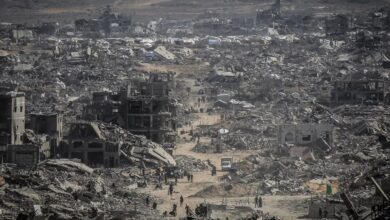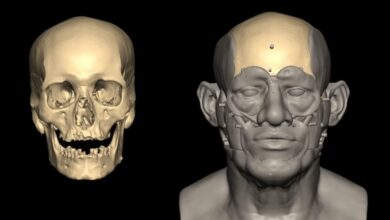The confiscation by State Security this week of a recently-deceased judge’s personal diaries and court documents has reignited debate about Egypt’s "Grand Jihad Case," the historic trial that followed the 1981 assassination of late president Anwar Sadat. Despite the passage of more than two decades, details of the trial remain shrouded in mystery, speculation and conspiracy theory.
Earlier this week, the house of former State Security Court Judge Abdel Ghaffar Mohamed was broken into and searched by police. Mohamed, who passed away less than three weeks ago, had been the presiding judge in the Sadat assassination case.
Muntassir el-Zayat, prominent lawyer and an attorney for Mohamed’s family, told Al-Masry Al-Youm that Mohamed’s personal memoirs and Sadat-related court documents had been seized by police. The late judge’s son, meanwhile, a former activist of an Islamist bent, was arrested, taken to an undisclosed location and released a few days later without explanation.
The authorities have not commented on the incident, nor was it reported in the official press.
According to el-Zayat, the move comes in reaction to a 2007 interview with Mohamed in Al-Masry Al-Youm, which — despite having been conducted more than two years ago — was only published late last month. In the interview, Mohamed hinted that he was privy to many "secrets" of the case, some of which were recorded in his diaries and the court documents still in his possession.
The judge went on to reveal previously unreported information related to the case, albeit with little elaboration. For instance, he claimed that Israel had influenced the trial proceedings by conditioning its military withdrawal from areas in the southern Sinai Peninsula on a death verdict for Khaled el-Islamboly, the alleged ringleader of the assassination plot, and his co-conspirators.
Mokhtar Nouh, a member of the plotters’ defense team at the time, believes that many facts related to the trial remain unknown.
"Was the judge influenced by the state security apparatus during the trial?" asked Nouh, noting that Mohamed had charged several police and state security officers involved in the case with using torture to extract confessions. "Why were these [officers] never indicted? Why did they go on to gain influence in the government and take up key positions around the country?"
Nouh also claims that the judges’ closed-door deliberations had been clandestinely recorded by State Security. "This is unprecedented," he said. "Why was this not investigated?"
These are only some of the questions about the case to have been raised by lawyers, historical researchers — and even government pundits — over the years.
In early October 2006, Talaat Sadat, former MP and nephew of the slain president, made a number of titillating press statements in which he cast doubt on the trial’s official conclusions. Most contentiously, Sadat claimed that a "puppet master" high-up in government had orchestrated the assassination from behind the scenes, using the Islamist plotters to further his own agenda.
The late president’s nephew went on to urge judicial authorities to re-investigate the dramatic events of 6 October, 1981. He pointed in particular to apparent security lapses by the president’s bodyguards and to the claim that el-Islamboly, while taking aim at Sadat, had clearly told then vice-president Hosni Mubarak to "step aside" so as to give him a clear shot at the president.
"[The assassin] said to Mubarak, ‘Step aside, I don’t want you — I want him’," Talaat Sadat alleged in a 2006 interview, noting that the order could be heard in un-aired footage of the episode.
The assassination took place two years after Sadat signed the Camp David peace agreement with Israel, rendering him "apostate" in the eyes of Egyptian Islamist groups. Because he was killed during a widely-televised military parade, the incident was caught on several television cameras.
The footage, parts of which were never broadcast in Egypt but are now available on Youtube.com, shows el-Islamboly breaking away from the military formation, running towards the spectators’ stand and shooting Sadat several times at close range. Another video, taken from inside the stand, shows Sadat lying on the floor, obviously wounded, while guards can be seen hustling Mubarak away from the scene.
In neither of these, however, can el-Islamboly clearly be seen shouting anything at Mubarak, as Talaat Sadat has contended.
At the time, Talaat Sadat even went so far as to tell Germany’s official news agency that the assassination had constituted “a limited military coup” conducted by Sadat’s top aides, including, perhaps, then Minister of Defense Colonel Abdel Halim Abu Ghazala.
Sadat went on to point to several pre-assassination developments suggesting the existence of a “grand conspiracy” aimed at the president’s violent overthrow. These developments included the death of Ahmad Badawy, Abu Ghazala’s predecessor as defense minister, in a 1981 helicopter crash; the abrupt reshuffle of Sadat’s republican guards; and the sudden removal of the head of Egyptian intelligence.
After making the controversial statements, Talaat Sadat was stripped of parliamentary immunity and referred to a military court for "propagating rumors about the Egyptian armed forces." With the approval of parliamentary speaker and ruling party stalwart Fathi Sorour, Sadat was later sentenced to one year in prison.
Since his subsequent release in August 2007, Sadat has refrained from making any further public statements on the issue.
When asked by Al-Masry Al-Youm if the information included in the judge’s memoirs bore any relation to Sadat’s claims, el-Zayat declined to comment, citing fears for his safety and that of his family were he to reveal too much. Nor, he stressed, were members of Mohamed’s family interested in commenting on the case.
Nouh, however, dismisses the claims of Talaat Sadat as “ravings.” He attributes the trial’s failings not to the existence of "high-up conspirators," but rather to the ineptitude of the intelligence apparatus. Before the trial, he notes, State Security lacked files on all the alleged conspirators, which included Ayman el-Zawahry and the Zommor brothers, who later became notorious for their connection with violent Egypt-based Islamist groups and the nebulous "Al-Qaeda."
Nouh pointed out that many of those who played roles in the trial have since passed away, are now in their 90s or are simply reluctant to talk. He went on to predict that the truth of the case would "die with the few left who witnessed it."
When asked whether he planned to provide his own version of what happened on that fateful day, Nouh said he was currently in the process of writing a book on the subject, although he refused to provide any hints as to the revelations the book might contain.




